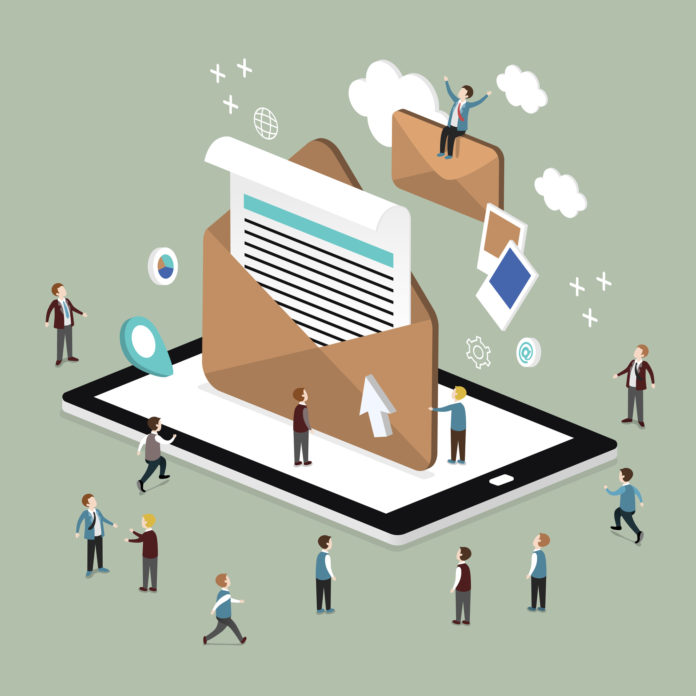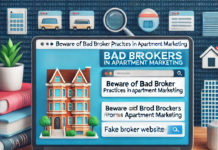Email marketing remains alive and well. In fact, email marketing continues to thrive in a noisy digital marketing world. As a result, marketers must incorporate email marketing services into their marketing portfolio.
“Every day, people and businesses send about 280 billion emails. And reports indicate the numbers of daily emails continue to increase and should reach roughly 333 billion by 2021 (in just 2 more years!). Additionally, email marketing yields significant returns. And these returns continue growing over time. For example, in 2015 a study by the DMA, showed the average email marketing campaign returns about $38 per $1. In 2017, the same DMA study showed the average email marketing campaign returned about $40 per $1. And yes, in 2018, the annual DMA study showed the average email marketing campaign returned roughly $43 per $1. So, for every $1 invested on email in 2015, business owners received $38. Last year, the same $1 investment returned $43!”
Email Template Design Basics
Email is quite popular, which means successful campaigns must stand out from the crowd. Therefore, while creating your email templates, incorporate the common features of successful emails. The email experts at HubSpot and MailChimp provide some tips for building effective email templates.
-
Deliver Clean & Concise Content
The most effective emails deliver a clean and concise message. As noted, we send and receive LOTS of email, so keep the message simple. For example, keep simplifying until the message focuses on one idea. (If you struggle simplifying, then break up the content into a series.) To maintain focus, then use a standard hierarchy with the most important content first and rely on headings, bullets and dividers, along with buttons to create a natural flow and link out to more in-depth details (and drive subscribers to your site!).
-
Include the Right Call to Action (CTA)
The CTA for a promotional email differs from the CTA for a transactional email. For example, a promotional email informing customers of the annual sale must include SALES and links to products throughout the email. Customers expect (and accept) the heavy hand. Conversely, in the quarterly review email, include links to new projects and updates. Customers want behind the scenes information (and do not accept sales). Understand why you are sending the email and be sure the CTA aligns with the purpose of the message.
-
Personalization
Personalization relies on obtaining real customer information (and not buying an email list). For example, include placeholders for first and/or last name. Additionally, as your strategy evolves, then you can segment your list by interests and region (as applicable). Enhanced email options, which drive results, rely on accurate information.
-
Ensure Responsive Design
HubSpot notes that 67% of emails today are read on mobile (smartphones or tablets) devices. In all likelihood, the email service provider of your choice offers responsive design templates, but keep this in mind during your design and QA phase. Preview the email on desktop, mobile and tablet views.
Fortunately, there are plenty email templates that help any company jumpstart their email marketing!
Welcome Email Templates
Naturally, a welcome email is the first genuine email a new subscriber receives.
“The purpose of your welcome email is to greet your new subscribers. It gives you the chance to make a good first impression. Remember, you can do it only once. You must nail it.”
Additionally, Wordstream recently conducted a study that indicated welcome emails generated 320% more revenue on a per email basis than any other type of email. As a result, welcome emails must reflect on your brand, tone and voice. If done correctly, this email sets the tone of future emails.
Chamaileon offers some more in-depth welcome email tips, along with a couple of great templates. Remember, not every design reflects your company, but includes the same basic features (i.e., personalization, responsiveness and CTA).
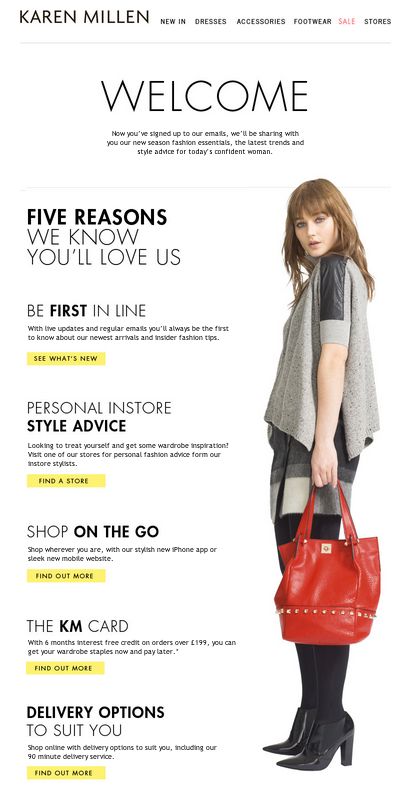
First and foremost, the email design reflects the overall Karen Millen brand. The email features a model, presumably showcasing the company’s products, which enables new subscribers to visualize themselves in Karen Millen merchandise. Plus, the email starts with a warm Welcome and follows with the expectations of how their email campaign benefits the subscriber. Setting expectations remains a pivotal part of effective marketing communications.
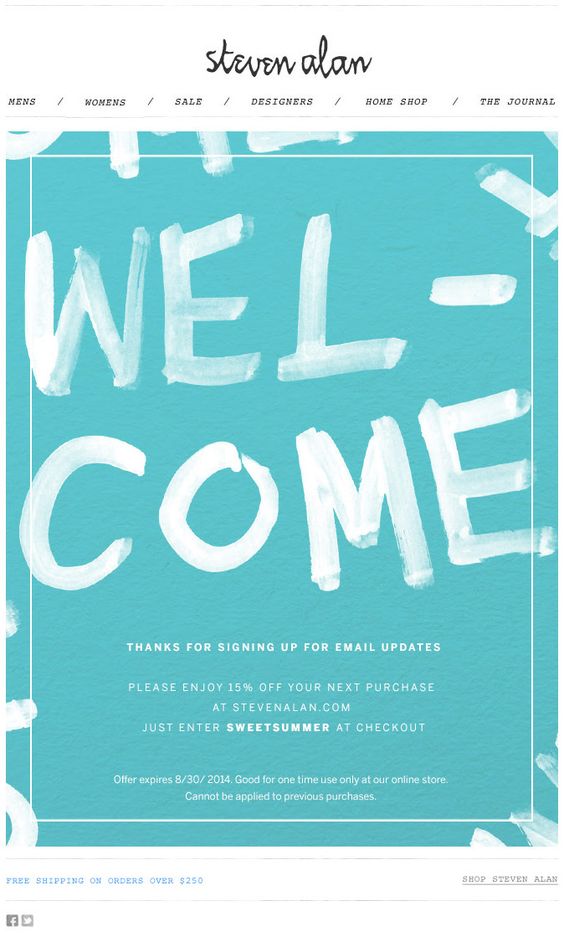 Steven Alan sends another Welcome email that provides a refreshing attitude. Although the color scheme differs from the main site, the email template includes brand continuity based on the header. Additionally, as an ecommerce company, the email highlights a new subscriber discount, which encourages a significant CTA (and validates the welcome email ROI!).
Steven Alan sends another Welcome email that provides a refreshing attitude. Although the color scheme differs from the main site, the email template includes brand continuity based on the header. Additionally, as an ecommerce company, the email highlights a new subscriber discount, which encourages a significant CTA (and validates the welcome email ROI!).

The Lyft Welcome email reflects the soft and personal brand. Additionally, the “Take a Ride” call-to-action button stands out and encourages new subscribers to jump in and use the service. The email hits the CTA by sharing the average price of a Lyft ride remains 30% less than the traditional cab. Finally, Lyft sets expectations by noting the series of Welcome emails that help customers look out for additional information regarding how to use the service.
Onboarding Email Templates
Onboarding emails typically follow the Welcome email. For example, as the Lyft Welcome email noted a series (1 of 4), onboarding emails help subscribers learn about your product. Ultimately, an onboarding email series works mainly for product and helps develop engagement with your product. However, onboarding emails work for any type of company and help new subscribers understand your brand and the value your work provides and answer any questions.
“Onboarding messages done right can give a little push to get [subscribers] started without coming across as pushy. Additionally, onboarding emails help you engage your prospects and find value in your product to get them into action. Onboarding email involves a mix of polite pitching and educating your users to start using your product.”
To help understand how to leverage onboarding emails, Beta Out shares some great examples.
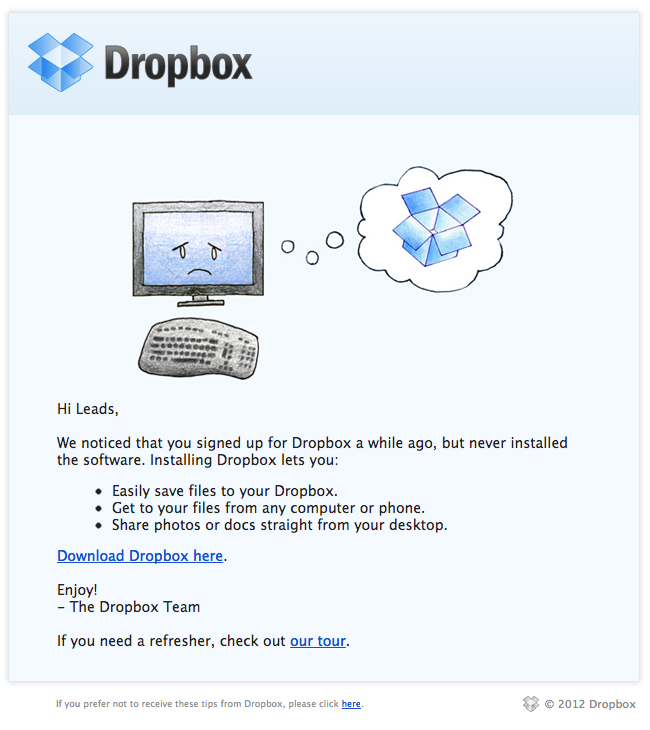
Dropbox leverages an onboarding email focused on completing the installation. Obviously, as a software provider, Dropbox needs subscribers to install the application in order to use the product. If not, then they will not be able to convert new sign ups into dedicated users. Therefore, the first phase on the onboarding process clearly focuses on how to download and sync your files. Clear, concise and on-brand!
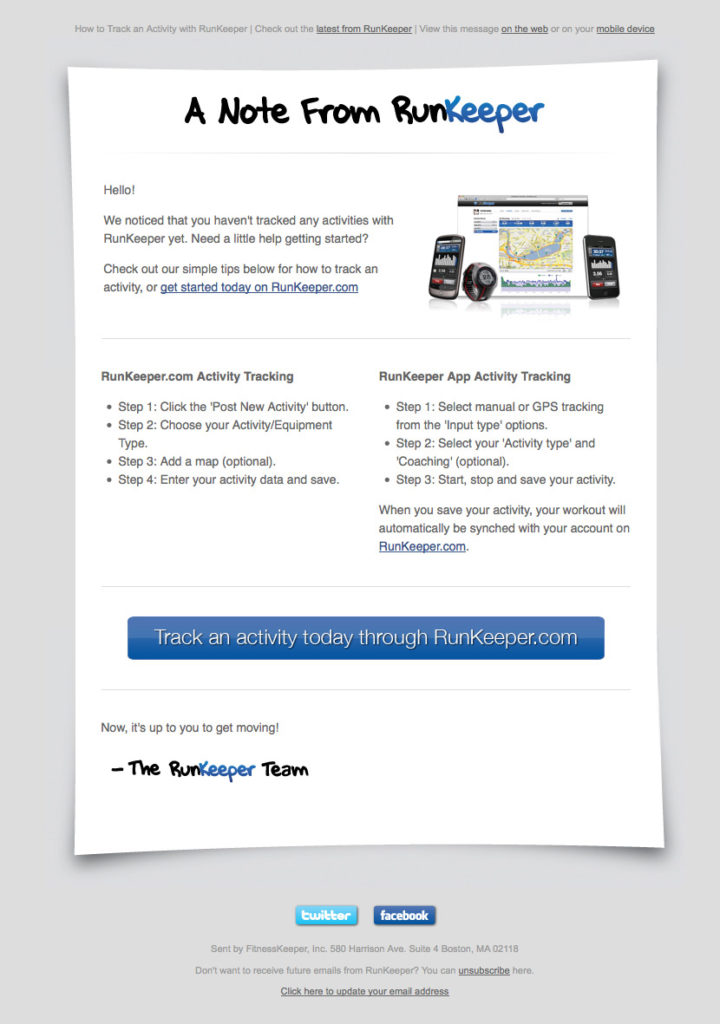
Similar to Dropbox, the Runkeeper onboarding email series emphasizes getting started. Afterall, every company keeps an essential metric that dedicated users reach in their early days. For Runkeeper, tracking an activity starts a new users goals. As a result, the onboarding email stands out with a unique “note from Runkeeper” followed by step-by-step directions to track that initial activity.
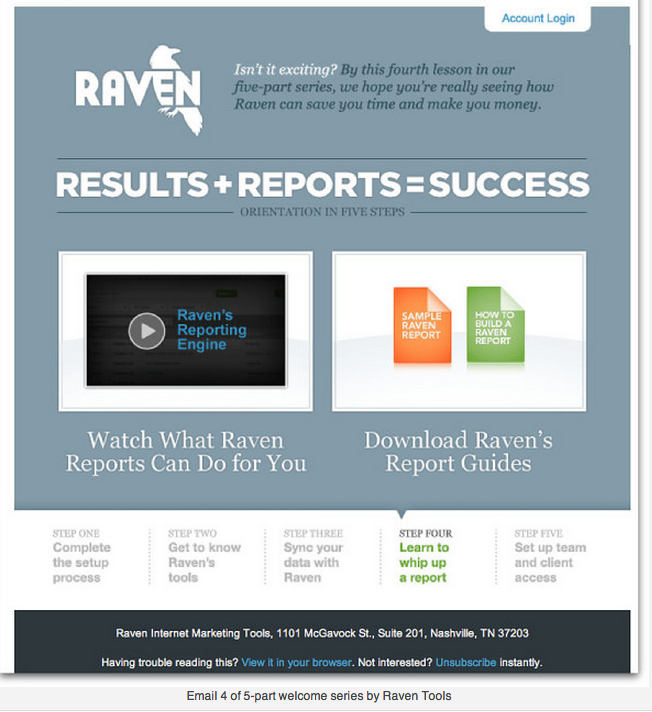
Raven Tools provides SEO analysis and online marketing solutions that combines various elements of SEO campaigns like research, analysis, and reporting into a unified and intuitive platform. As a result, Raven Tools relies on an educational based onboarding series that focuses on free guides and videos to help new users understand how to use the product and marketing tools. Again, Raven Tools understands what subscribers need to become dedicated users and provides information that create engagement with their product.
Drip Emailing
At times, onboarding email campaigns work as drip email marketing, which produce a series of automated emails that ideally keep subscribers engaged.
“Drip marketing is a communication strategy that sends, or “drips,” a pre-written set of messages to customers or prospects over time. These messages often take the form of email marketing…Drip marketing is distinct from other database marketing in two ways: (1) the timing of the messages follow a predetermined course; (2) the messages are dripped in a series applicable to a specific behavior or status of the recipient. It is also typically automated.”
Relational Email Templates
Relational emails focus on developing engagement with your brand. In these emails, do not focus on sales, but concentrate on worthwhile updates to the company or new hires (depending on your company). Additionally, consider some behind the scenes or company pet to generate interest and personality via routine newsletter.
“Once a subscriber has made a purchase, it’s time to develop a fruitful relationship. After all, your goal is to have long-term, loyal customers, rather than just those who make a purchase once and move on. To keep subscribers engaged with your product and brand, consider sending a regular email newsletter. A newsletter has endless possibilities. You can send content about product improvements, staffing changes, growth potential, industry updates, upcoming events, and much more.”
HubSpot provides a plethora of email templates and examples, including relational emails.
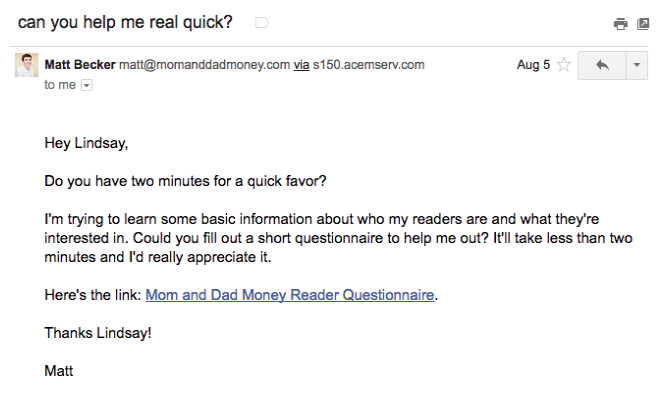
Mom and Dad Money helps parents manage their finances. Money is a personal topic and it takes time to develop trust. In this relational email, Mom and Dad Money sends a “personal” email to subscribers in order to develop more relevant topics, tips and advice. As you can read, the email is simple and concise. The survey aims to gather information and offers no sales or other promotional content. A great relationship building email example.

Building relationships take time. As a result, one of the main types of relational emails remains the weekly (or monthly) email. InVision sends weekly emails that highlights the best content, design links and a small freebie opportunity. From educational info on the site to external news and an engagement opportunity, the InVision weekly email keeps people engaged with unique CTA buttons.

Stitcher offers on-demand podcasts and radio programs. As a result, their update emails take the opportunity to showcase new content. Stitcher acknowledges the importance of personalization and starts of with “Recommended For You.” The app requires repeat usage, therefore, continually providing new programs is a great way to keep engagement levels high.
Sales Email Templates
Sales emails are pretty self-explanatory. However, proper sales and/or promotional email campaigns require the proper strategy. Simply sending a link with clearance products does not help with engagement. It takes balance along with maintaining the brand voice and imagery that subscribers expect.
“Promotion is more than just getting the word out. It’s a delicate balance of great design, exciting copy and a genuinely interesting topic. Email promotions templates deliver bold, beautiful layouts, giving you one less thing to worry about.”
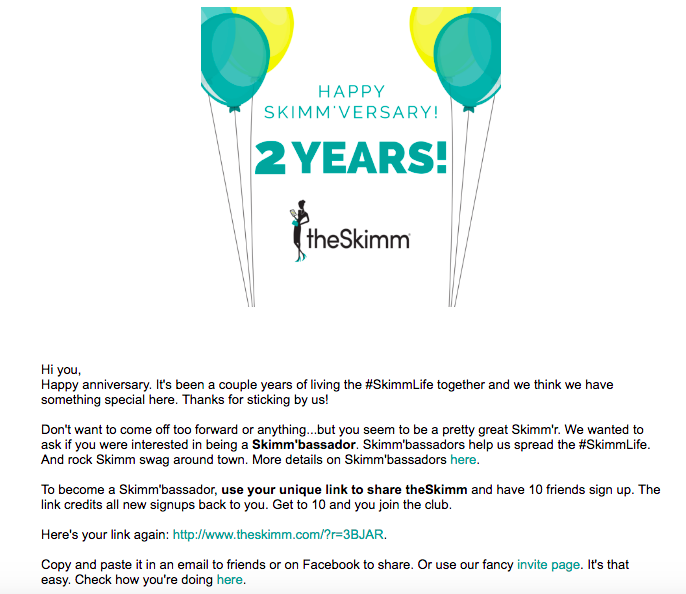
TheSkimm provides a daily subscription newsletter. In this example, TheSkimm combines a relationship and sales email by reminding subscribers that their current subscription is nearing an end. Obviously, keeping subscribers engaged is critical to a daily newsletter, which TheSkimm delivers. For example, note the email acknowledges the anniversary of their subscription and a CTA to become a brand ambassador.
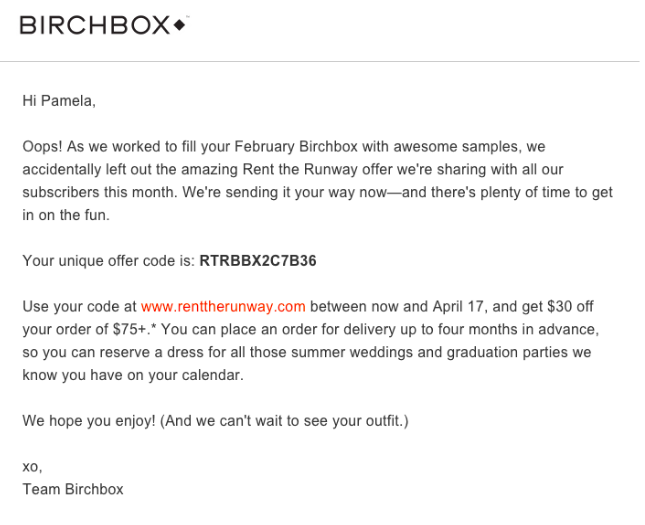
Birchbox provides subscribers with a unique set of beauty products every month. Understandably, the company sends emails confirming receipt of monthly deliveries for engagement and retention, but also for customer service channels. In this example, Birchbox surprises subscribers with a cross-promotion with a related service. Although a sales email, Birchbox provides a genuine surprise and worthwhile offer. A great way to boost sales and engagement!
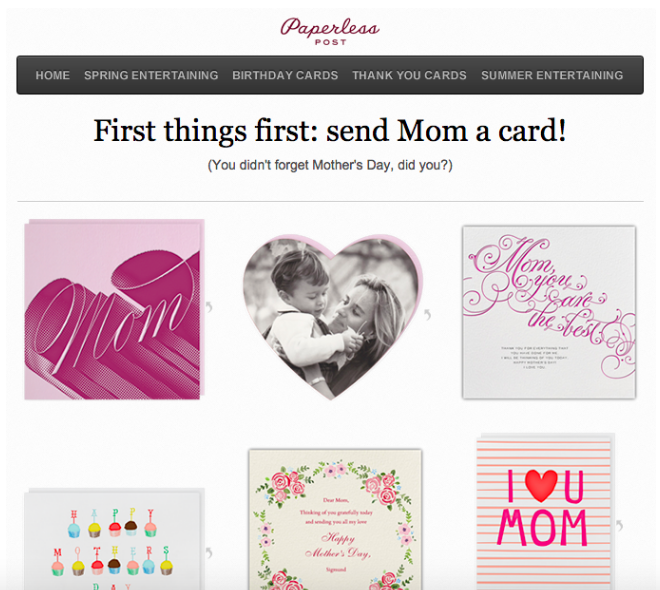
Paperless Post is an online card and invitation company. As a result, every holiday is part of their event driven marketing efforts. In this example, Paperless Post starts with a clear call-to-action. Send Mom a Mother’s Day Card! If you forgot, this is extremely useful and Paperless Post can help. If you knew about the upcoming holiday, then the email generates goodwill because you may forgot about another holiday and know Paperless Post has options to help!
Customer Service Email Templates
If one of the main reasons email marketing drives huge ROI for small business, then customer service offers a critical rationale. Additionally, customer service emails serve a variety of purposes, but also offer the chance to personally engage with existing or prospective customers. Groove HQ details why customer service emails make a difference.
“Any given company probably sends hundreds of customer service emails daily, and it can be easy to lose sight of just how important every single one of them is. But for any given customer, it might be the only interaction with your business that they’ll have that day. That lone interaction can completely (re)shape the way they feel about doing business with you. If they don’t feel like they got good service, it’ll damage their view of your business. If they come away delighted, you’re one step closer to having a committed customer for life. Doing customer service emails right is worth the effort.”
For more examples of customer service email templates, than HubSpot offers a few good use cases.
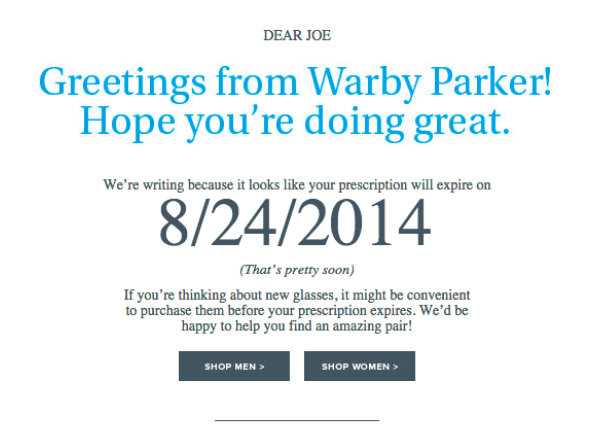
Although most of us assume customer service emails deal with problems, Warby Parker demonstrates proactive customer service. For example, Warby Parker sells glasses, which obviously are tied to a prescription. Therefore, the Warby Parker team provides some advance notice of an expiring prescription, which benefits the company in a few ways. First, many Warby Parker locations offers optometrists for customers. Additionally, for folks with an optometrist, the email serves as a reminder to look for new glasses (if they need a new subscription).
 A common customer service issue remains folks that need help using a product. Therefore, the customer service team can take a lot of time answering the same questions. As a result, the Groove HQ team asks about the solutions a customer already tried. This helps reduce volume because many customers won’t respond, but more importantly, understanding the steps a customer already took helps provide immediate value by not repeating standard troubleshooting steps.
A common customer service issue remains folks that need help using a product. Therefore, the customer service team can take a lot of time answering the same questions. As a result, the Groove HQ team asks about the solutions a customer already tried. This helps reduce volume because many customers won’t respond, but more importantly, understanding the steps a customer already took helps provide immediate value by not repeating standard troubleshooting steps.
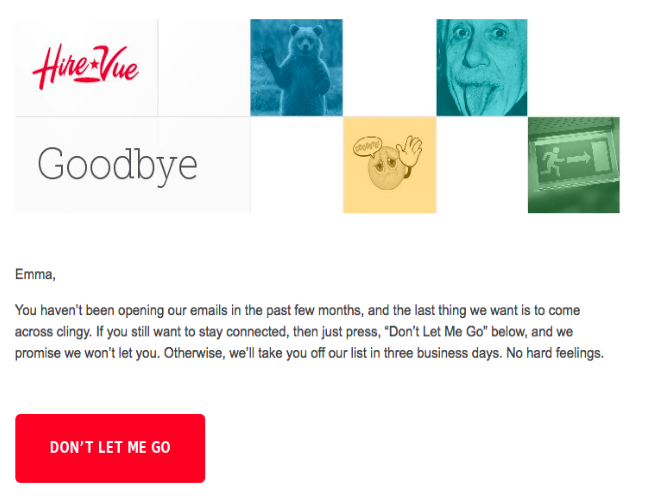
As we now all know, the distribution list remains the lifeline of a successful email marketing campaign. Therefore, many unsubscribe emails filter into the customer service (and customer retention) teams. However, in this example, HireVue offers a simple and gilt free message with a whimsical design for non-responsive subscribers. In both situations, email marketers want an engaged distribution list, so ensuring subscribers still want your content remains part of every successful email strategy.
Trigger Email Templates
Trigger emails are commonly grouped with customer service emails because they act as a driver of customer interaction. For example, the Warby Parker email works as a trigger email because the purpose drives (or triggers) a potential action (in this case, purchase new glasses or sign up for an optometrist appointment). Additionally, Chamaileon offers some more details on proper trigger email campaigns.
“Triggered emails are fired by specific actions taken by website visitors. This automated process is also called behavioral marketing automation. It allows marketers to send automated messages based on the user’s behavior. These emails are successful because they are timely and highly relevant to the recipient. Essentially, trigger marketing is based on a series of events. Trigger-based emails must be part of your email marketing strategy. Thanks to sophisticated targeting, you can build trust with customers and make sure you don’t leave any money on the table. Another benefit is that automated emails help you with the operational tasks, so there is no need to send invoices or confirmation emails one by one, for instance. You can be more efficient and use your resources more wisely as well.”
Activation Email Templates
Activation emails work in conjunction with trigger emails, but mainly focus on potential customers. Conversely, trigger emails work for existing and potential customers. However, activation emails primarily drive initial adoption. For example, many software products require an email sign up, but potential customers never log back into the application to test the product. Customer.io helps explain how activation emails help overcome this hurdle.
“A user’s trial period and beyond the end of the trial, when you’d like to win them back is the prime window of opportunity. The later it gets past the signup date, the more you’ll think about different winback tactics because that interest and initial energy will have dissipated. So your goal is to reach out to folks who signed up for a trial and rekindle them with a spark powerful enough to get them meaningfully re-engaged. Expect to invest time creating a full campaign, not a few disparate emails. It’s also not a great time for your call-to-action to be about payment and upgrading, since you’re trying to motivate people back into intermediate stages of the buying journey, like consideration and evaluation. Instead, ask them to take one small step forward. Prompting an action, almost any action, means that you can start building momentum. Let’s get to it!”
Don’t Forget to Track Your Email Campaigns!
As any diligent marketer, track your performance! Yes, email marketing is not immune to data-driven adjustments. From A/B testing CTA buttons to experimenting with the right hierarchy or mix of content, it takes time to hone your various email templates.
To help, HubSpot offers a useful email planning template that will jumpstart your email campaigns.
“Using this template will help you: Organize which emails you send to each segments of your database, remember what A/B tests you’re conducting, and summarize high-level results. What’s best of all is that you can customize this Excel spreadsheet however you see fit for your own organization.”
Does email marketing still seem daunting?
It may, but like basically everything that add value, it takes time and patience to achieve your desired results. However, keep in mind that the results are worth it!


